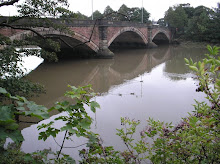What makes communities like Broadgate work?
People like Robert Putnam have researched the 'social glue' that holds communities together, reduces crime and makes people feel happier, and actually be healthier, and live longer lives.
The good news is, the things that hold communities together can be simple and easy, and don't have to cost a lot of money.
Here are a few suggestions, culled from an even bigger list published here:
http://www.bettertogether.org/150ways.htmHow many have
you done in the last month?
1. Turn off your TV or PC
2. Go outside
3. Attend a BRAG/PACT meeting
4. Support local shopkeepers
5. Volunteer your special skills to a community organisation
6. Give blood (with a friend)
7. Work in a community garden
8. Surprise a new, or favourite neighbour by taking them food
9. Avoid destructive gossip
10. Help another person, outside your home with something
11. Attend local school or children's athletics, plays and recitals
12. Get involved in Scouts or Guides
13. Sing in a choir
14. Attend a party at someone else's home
15. Get to know your local shopkeepers
16. Audition for community theatre, or to support a production backstage, or volunteer to usher
17. Attend a lecture or concert
18. Give to your local food or clothing bank
19. Play cards or games with neighbours
20. Walk or bike to support a cause, and meet others
21. Participate in a political campaign
22. Attend a local festival or parade
23. Do something for your Trade Union, outside work
24. Find a way to show personal appreciation to someone who builds your local community
25. Coach or help out with local (youth) sport
26. Offer to help a neighbour with garden work, shopping or a lift
27. Start or participate in a discussion group, book, or film club
28. Start or join a car-pool
29. Plan a 'walking tour' of local historic areas and beauty spots
30. Tutor or read to children, and have children read to you
31. Run for public office
32. Invite neighbours over for a meal
33. Host a party
34. Offer to serve on a committee outside of work
35. Form a ramblers group, or a swimming group, with at least one other person, then encourage each other
36. Play a sport
37. Go to church, temple or mosque
38. Ask an older person to teach you something
39. Host a Jacob's Join
40. Take dance lessons with a friend
41. Become a school governor
42. Join a campaign and take action that brings you into contact with others
43. Gather a group together to clean up a local park
44. Bake something for new neighbours or work colleagues
45. Plant trees
46. Volunteer at the library, primary school or a charity shop
47. Call an old friend
48. Sign up for a college course, and meet your classmates
49. Accept or extend an invitation
50. Go for a walk in the park
51. Say hello to strangers
52. Find out more by talking to a neighbour you don't know very well yet
53. Collect oral histories to discover the interesting things people around here have done
54. Join in to help carry something heavy
55. Make gifts of time
56. Greet people
57. If you think someone needs help, ask to find out, and then do what you can
58. Fix it, even if you didn't break it
59. Pick up litter, even if you didn't drop it
60. Attend gallery openings, and art exhibits
61. Organise a neighbourhood car boot sale
62. Read or listen to the local news
63. Write an article for this blog, or for Broadgate News
64. Help deliver the Broadgate News
65. Attend a public meeting, and speak out on local issues
66. When inspired, write a personal note, or send a card to friends
67. Offer to watch a neighbour's flat or home while they are away
68. Bring next doors bins in for them
69. Help out with recycling
70. Start talking to people you see regularly
71. Listen to the children you know, and find out what matters to them
72. Ask to see a friends photos
73. Invite a local politician or official to speak to a group you belong to
74. Plan a reunion of family, friends, or people with whom you have a special connection
75. Hire local young people for odd jobs
76. Write a letter to the editor
77. Join a group that is likely to lead to making new friends of a different ethnicity
78. Sit on your doorstep
79. Fight to keep your essential local services
80. See if your neighbour needs something when you run to the store
81. Be nice when you drive
82. Find out more about another culture, by talking to a neighbour from another culture
83. (Add your own here!)...............................................
84. ....................................................................................
85. ....................................................................................
Come on, what are you waiting for! If you don't do it, who else will?













